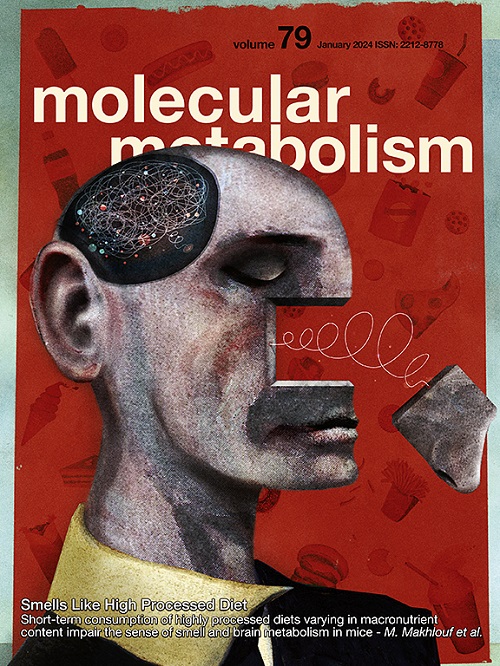评估二甲双胍对糖尿病小鼠肠道功能和微生物群的影响及其对改善葡萄糖耐量的贡献。
IF 6.6
2区 医学
Q1 ENDOCRINOLOGY & METABOLISM
引用次数: 0
摘要
虽然降糖药物二甲双胍的作用机制仍在讨论中,但越来越多的证据表明肠道起着关键作用。为了阐明二甲双胍引起的肠道变化是否直接促进代谢改善,我们评估了在高脂高糖饮食10周后葡萄糖不耐受的小鼠中,口服四甲双胍剂量增加(从50到200 mg/kg/天)4周的效果。研究了一些肠道参数,包括盲肠微生物群组成和胆汁酸谱、回肠FXR信号、glp1产生细胞和杯状细胞的丰度以及血液代谢组。二甲双胍以剂量依赖的方式恢复葡萄糖耐量、空腹胰岛素血症和HOMA-IR指数。只有一小部分肠道相关效应,包括粘液产生和GLP-1表达,表现出平行的剂量-反应关系,这表明可能有助于观察到的代谢改善。相比之下,其他变化,包括回肠Fxr-Fgf15抑制和肝神经酰胺减少,不随剂量增加而增加,这表明它们不是二甲双胍剂量依赖性血糖控制作用的主要驱动因素。我们还指出,肠道细菌对二甲双胍的明显差异敏感性支持药物与微生物生态系统的复杂相互作用。最后,二甲双胍促进肠上皮的增殖,导致回肠绒毛长度增加。总之,本研究为二甲双胍的作用机制提供了新的见解,并揭示了潜在的新的微生物生物标志物和靶点,以提高其治疗效果。本文章由计算机程序翻译,如有差异,请以英文原文为准。
Evaluation of the effects of metformin on gut functions and microbiota and their contribution to improving glucose tolerance in diabetic mice
Objectives
Although the mechanism of action of the antidiabetic drug metformin is still a matter of discussions, increasing evidence points to a pivotal role of the gut. Aiming to clarify whether metformin-induced changes in the intestinal tract directly contribute to metabolic improvement, we evaluated the effects of escalating doses (from 50 to 200 mg/kg/day) of metformin orally administered for 4 weeks in mice made glucose intolerant by ten weeks of high fat high sucrose diet.
Methods
Several intestinal parameters were studied, including caecal microbiota composition and bile acids profile, ileal FXR signaling, abundance of GLP1-producing cells and goblet cells and blood metabolome.
Results
Metformin restored glucose tolerance, fasting insulinemia and HOMA-IR index in a dose-dependent manner. Only a subset of gut-related effects, including mucus production and GLP-1 expression, exhibited a parallel dose–response relationship, suggesting a possible contribution to the observed metabolic improvements. In contrast, other changes, including ileal Fxr-Fgf15 inhibition and hepatic ceramide reduction did not scale with dose, suggesting they are not the main drivers of metformin dose-dependent effects on glycemic control. We also pointed out marked differential sensitivity of gut bacteria to metformin supporting complex interactions of the drug with the microbial ecosystem.
Conclusion
Finally, metformin enhanced the proliferation of intestinal epithelium, resulting in increased length of ileal villi. Altogether, this study offers new insights into the metformin mechanism of action and revealed potential novel microbial biomarkers and targets for enhancing its therapeutic efficacy.
求助全文
通过发布文献求助,成功后即可免费获取论文全文。
去求助
来源期刊

Molecular Metabolism
ENDOCRINOLOGY & METABOLISM-
CiteScore
14.50
自引率
2.50%
发文量
219
审稿时长
43 days
期刊介绍:
Molecular Metabolism is a leading journal dedicated to sharing groundbreaking discoveries in the field of energy homeostasis and the underlying factors of metabolic disorders. These disorders include obesity, diabetes, cardiovascular disease, and cancer. Our journal focuses on publishing research driven by hypotheses and conducted to the highest standards, aiming to provide a mechanistic understanding of energy homeostasis-related behavior, physiology, and dysfunction.
We promote interdisciplinary science, covering a broad range of approaches from molecules to humans throughout the lifespan. Our goal is to contribute to transformative research in metabolism, which has the potential to revolutionize the field. By enabling progress in the prognosis, prevention, and ultimately the cure of metabolic disorders and their long-term complications, our journal seeks to better the future of health and well-being.
 求助内容:
求助内容: 应助结果提醒方式:
应助结果提醒方式:


